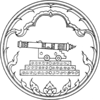Pattani Province
|
Pattani ปัตตานี |
|||
|---|---|---|---|
| Province | |||

Pattani Grand Mosque
|
|||
|
|||
 Map of Thailand highlighting Pattani Province |
|||
| Country |
|
||
| Capital | Pattani | ||
| Government | |||
| • Governor | Wiranan Phengchan (since October 2016) | ||
| Area | |||
| • Total | 1,940.4 km2 (749.2 sq mi) | ||
| Area rank | Ranked 67th | ||
| Population (2014) | |||
| • Total | 686,186 | ||
| • Rank | Ranked 39th | ||
| • Density | 350/km2 (920/sq mi) | ||
| • Density rank | Ranked 9th | ||
| Time zone | ICT (UTC+7) | ||
| ISO 3166 code | TH-94 | ||
Pattani (Thai: ปัตตานี, pronounced [pàt.tāː.nīː]) is one of the southern provinces (changwat) of Thailand. Neighboring provinces are (from southeast clockwise) Narathiwat, Yala, and Songkhla.
The name Pattani is the Thai adaptation of the Malay name Patani (Jawi: ڤتاني), which can mean "this beach" in Patani Malay language. (In standard Malay, this would be pantai ini.) Another suggestion is that it derives from a Sanskrit word pathini, meaning "virgin nymph"; Pathini was the name of a daughter of Merong Mahawangsa, founder of the preceding Langkasuka Empire.
Historically, Pattani Province was the centre of the Malay Sultanate of Patani Darul Makrif. For centuries a tributary state of Siam, Pattani has been governed by Siam since its conquest in 1785. Siamese rule was officially acknowledged by the Anglo-Siamese Treaty of 1909 negotiated with the British Empire. Both Yala (Jala) and Narathiwat (Menara) were originally part of Patani, but were made provinces of their own during the territorial administrative reform and the creation of a united centralized Siam state.
Pattani is one of the four provinces of Thailand where the majority of the population are Malay Muslim. They make up about 88 percent of its population. The people speak the Patani Malay language, although most also speak Thai. The Pattani Malays are similar in ethnicity and culture to the Malays of Kelantan, Malaysia.
...
Wikipedia


